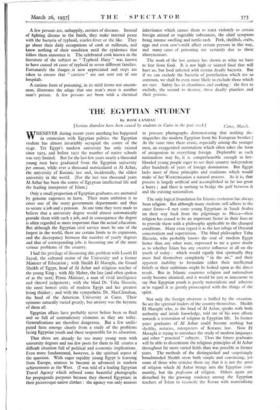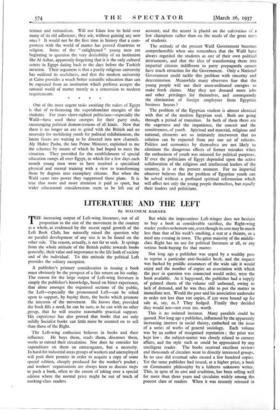THE EGYPTIAN STUDENT
By ROM LANDAU
[Serious disorders have been caused by students in Cairo in the past week.] Cairo, March.
WHENEVER during recent years anything has happened in connexion with Egyptian politics the Egyptian student has almost invariably occupied the centre of the stage. Yet Egypt's modem university has only existed since 1925, and before 1922 the number of native schools was very limited. But for the last few years nearly a thousand young men have graduated from the Egyptian university per annum, while over a thousand matriculated at Al Azhar, the university of Koranic law and, incidentally, the oldest university in the world. (For the last two thousand years Al Azhar has been the centre of Egyptian intellectual life and the leading interpreter of Islam.) Only a small proportion of Egyptian graduates are animated by genuine eagerness to learn. Their main ambition is to enter one of the many government departments and thus to secure a job and a pension. At one time they were made to believe that a university degree would almost automatically provide them with such a job, and in consequence the degree is often regarded as more important than the actual education. But although the Egyptian civil service must be one of the largest in the world, there are certain limits to its expansion, and the discrepancy between the number of yearly degrees and that of corresponding jobs is becoming one of the more serious problems of the country.
I had the privilege of discussing this problem with Loutfi El Sayed, the cultured rector of the University and a former Minister of Education ; with Sheikh El Maraghi, the Grand Sheikh of Egypt, head of Al Azhar and religious teacher of the young King ; with Aly Maher, the late (and often spoken of as the next) Prime Minister, a man of vivid intelligence and shrewd judgement; with the blind Dr. Taha Hussein, the most honest critic of modern Egypt and her greatest living thinker ; and with the sympathetic Dr. MacClenahan, the head of the American University at Cairo. Their opinions naturally varied greatly, but anxiety was the keynote of them all.
Egyptian affairs have probably never before been so fluid and so full of contradictory elements as they are today. Generalisations are therefore dangerous. But a few undis- puted facts emerge clearly from a study of the problems facing Egyptian youth and those responsible for its education.
That there are already far too many young men with university degrees and too few posts for them to fill creates a difficult situation full of political and economic implications. Even more fundamental, however, is the spiritual aspect of the question. With eager rapidity young Egypt is learning from Europe, anxious to become as advanced in modern achievements as the West. (I was told of a leading Egyptian Travel Agency which refused some beautiful photographs for propaganda purposes because they showed Egyptians in their picturesque native clothes : the agency was only anxious to procure photographs demonstrating that nothing dis- tinguishes the modern Egyptian from his European brother.) At the same time there exists, especially among the younger men, an exaggerated nationalism which often takes the form of antagonism to everything foreign. Deplorable as such nationalism may be, it is comprehensible enough in hot- blooded young people eager to see their country independent after hundreds of years of foreign domination. But Egypt lacks most of those principles and traditions which would make of her Westernisation a natural process. As it is, that process is largely artificial and accomplished in far too great a hurry ; and there is nothing to bridge the gulf between it and the existing nationalism.
The only logical foundation for Islamic evolution has always been religion. But although many students still adhere to the outer forms—I met some young Egyptians in Saudi Arabia on their way back from the pilgrimage to Mecca—their religion has ceased to be an important factor in their lives or to provide them with a philosophy applicable to the changed conditions. Many even regard it as the last refuge of Oriental conservatism and superstition. The blind philosopher Taha Hussein, who probably knows the soul of modern Egypt better than any other man, expressed to me a grave doubt as to whether Islam has any creative influence at all on the youth of today : which would signify that spiritually they must find themselves completely " in the air," and their apparent inability to formulate either their intellectual beliefs or their ambitions might be looked upon as the direct result. But in Islamic countries religion and nationalism easily become identical, and it would be just as inaccurate to say that Egyptian youth is purely materialistic and atheistic as to regard it as greatly preoccupied with the things of the spirit.
Not only the foreign observer is baffled by the situation. So are the spiritual leaders of the country themselves. Sheikh El Maraghi who, as the head of Al Azhar, speaks with both authority and inside knowledge, told me of his own efforts towards a restoration of religion in Egyptian life. In former years graduates of Al Azhar could become nothing but sheikhs, notaries, interpreters of Koranic law. Now El Maraghi is trying to introduce the study of modern languages and other " practical " subjects. Thus the future graduates will be able to disseminate the religious principles of Al Azhar throughout far more varied fields than was possible in former years. The methods of the distinguished and surprisingly broadminded Sheikh seem both simple and convincing, yet some of those who criticise them say that it is not the spirit of religion which Al Azhar brings into the Egyptian com- munity, but the profession of religion. Others again are disturbed by the growing tendency among the Egyptian teachers of Islam to reconcile the Koran with materialistic science and rationalism. Will not Islam lose its hold over many of its old adherents, they ask, without gaining any new ones ? It would not be the first time in history that a com- promise with the world of matter has proved disastrous to religion. Some of the " enlightened " young men are beginning to question the very desirability of an institution like Al Azhar, apparently forgetting that it is the only cultural centre in Egypt dating back to the days before the Turkish invasion. Their argument is that a purely religious university has outlived its usefulness, and that the modern university at Cairo provides a much better scientific education than can be expected from an institution which perforce accepts the rational world of matter merely as a concession to modern requirements.
* * * * One of the most urgent tasks awaiting the rulers of Egypt is that of re-focussing the superabundant energies of the students. For years short-sighted politicians—especially the Wafd—have used those energies for their party ends, encouraging political demonstrations of all kinds. Now that there is no longer an axe to grind with the British and no necessity for mobilising youth for political exhibitionism, the latent forces are waiting to be directed into new channels. My Maher Pasha, the late Prime Minister, explained to me the schemes by means of which he had hoped to meet the situation. They provided for the establishment of special education camps all over Egypt, in which for a few days each month young men were to have received a specialised physical and mental training with a view to transforming them by degrees into exemplary citizens. But when the Wafd came into power they suppressed those plans. It is true that more and more attention is paid to sport, but wider educational considerations seem to be left out of account, and the accent is placed on the cultivation of a few champions rather than on the needs of the great mass of students.
The attitude of the present Wed Government becomes comprehensible when one remembers that the Wafd have always regarded the students as one of their own political instruments, and that the idea of transforming them into impartial citizens indifferent to party propaganda cannot have much attraction for the Government. Only a National Government could tackle this problem with sincerity and determination. Meanwhile many observers fear that the young people will use their unco-ordinated energies • to make fresh claims. May they not demand more jobs and other privileges for themselves, and consequently the elimination of foreign employees from Egyptian business houses ?
The problem of the Egyptian student is almost identical with that of the modern Egyptian soul. Both are going through a period of transition. In both of them there are the eagerness and the impatience, the conceit and the sensitiveness, of youth. Spiritual and material, religious and national, elements are so intimately interwoven that no solution can be expected from any one set of reforms. Politics and economics by themselves are not likely to eliminate the dangerous effects of former mistakes when the enthusiasm of youth was misused for political purposes. If ever the politicians of Egypt depended upon the active collaboration of the religious and intellectual leaders of the country, it is at the present moment. For no impartial observer believes that the problem of Egyptian youth can be solved without a profound spiritual reformation which will affect not only the young people themselves, but equally their leaders and politicians.











































 Previous page
Previous page